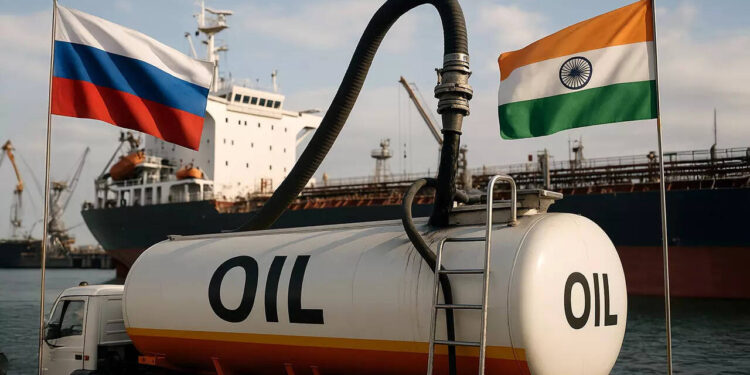
India Russia Oil: Trump Says India Will Stop Buying Russian Oil: Former U.S. President Donald Trump has stirred global headlines once again by claiming that India will soon stop buying Russian oil. Speaking to reporters at the White House, Trump said Indian Prime Minister Narendra Modi assured him that New Delhi would phase out Russian crude purchases “within a short period of time.”
“He assured me there will be no oil purchased from Russia. You can’t do it immediately; it’s a bit of a process, but the process will be over with soon,” Trump said, calling it a “big stop” in his effort to curb Moscow’s war funding in Ukraine.
The statement comes amid Washington’s ongoing campaign to cut Russia’s energy revenue — a key source of funding for its war effort — by pressing allies and trade partners to end their oil imports from Moscow.
India Yet to Confirm Trump’s Remark
So far, the Indian government has neither confirmed nor denied Trump’s statement. Officials in New Delhi have maintained that India’s energy policy is guided by national interest, not external pressure.
India has long defended its decision to continue purchasing discounted Russian crude, arguing that affordable oil imports are essential to control inflation and meet domestic energy demands.
A senior Indian official told local media that “energy security cannot be compromised,” indicating that the country’s stance on Russian oil remains unchanged.
Russian Oil Still Powers India’s Energy Mix
According to data from Kpler and the Centre for Research on Energy and Clean Air (CREA), Russia remains India’s largest crude oil supplier, accounting for about 34% of all inbound shipments in September 2025.
In the same period, India imported more than 4.5 million barrels per day (bpd) of crude, with Russia contributing roughly 1.6 million bpd. Although this marks a 10% dip from earlier in the year, the reduction is attributed to market fluctuations rather than political factors.
Economists point out that India’s diversified sourcing strategy allows it to balance between Russian, Middle Eastern, and U.S. suppliers, reducing price shocks and ensuring steady supplies.
Tariffs and Diplomatic Tensions
Trump’s claim comes just months after his administration imposed punitive tariffs totaling 50% on Indian goods, including a 25% penalty directly tied to oil purchases from Russia. The move has strained U.S.–India trade relations, even as the two countries cooperate in defense, technology, and investment sectors.
Despite the tariffs, India’s refined oil exports to Europe and Asia have continued to rise, indicating that its energy trade network remains resilient.
Energy analysts suggest that Trump’s remarks could be part of a political strategy ahead of the upcoming U.S. elections, aimed at projecting global leverage and pressuring major economies to align with Washington’s sanctions policy.
Political Reactions in India
Trump’s comments sparked strong political reactions at home. Rahul Gandhi, Leader of the Opposition in the Lok Sabha, accused PM Modi of being “frightened” of Trump.
“PM Modi allows Trump to decide and announce India’s energy decisions. This compromises our sovereignty,” Gandhi wrote on X (formerly Twitter).
The Congress Party also accused the government of “damaging India’s diplomatic ties with Russia,” a long-standing strategic ally.
However, BJP leaders dismissed the criticism, emphasizing that India’s foreign policy is based on strategic autonomy and “mutual respect among partners.”
Market Impact and Global Energy Outlook
Trump’s statement caused a brief spike in global oil prices, as traders speculated that India’s potential withdrawal from Russian oil could tighten supply. The Indian rupee, meanwhile, strengthened slightly against the U.S. dollar following expectations of eased trade friction.
Experts warn, however, that a complete halt of Russian crude purchases could disrupt India’s refining industry, raise fuel prices, and impact consumers.
“India cannot instantly switch away from Russian oil without major economic costs,” said an energy policy analyst at CREA. “It’s a gradual transition, not an overnight shift.”
Globally, countries like China and Turkey continue to buy Russian oil in large volumes, ensuring that Moscow’s energy revenue remains substantial despite Western sanctions.
Conclusion: Between Politics and Energy Realities
While Donald Trump’s claim has added fresh drama to international politics, India’s oil strategy remains firmly pragmatic. The numbers reveal that Russian crude continues to power the Indian economy, even as New Delhi explores diversification and cleaner alternatives.
For now, India seems unlikely to end Russian oil imports completely — at least until market stability, pricing, and global diplomacy align in its favor.














